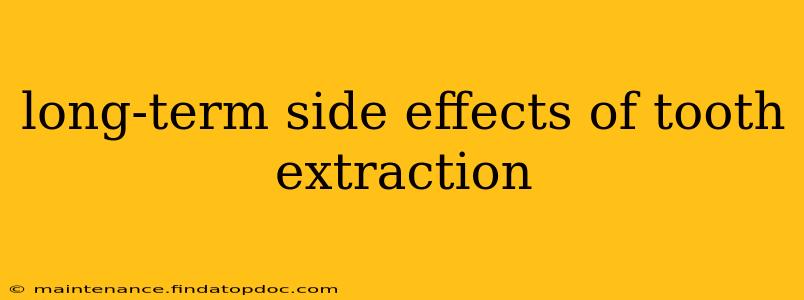Tooth extraction, while a common procedure, isn't without potential long-term consequences. Understanding these potential side effects is crucial for informed decision-making and proper post-operative care. This comprehensive guide explores the long-term ramifications of tooth extraction, addressing common concerns and offering valuable insights.
What are the Potential Long-Term Side Effects of Tooth Extraction?
The most significant long-term side effects of tooth extraction relate to the loss of the tooth itself and the subsequent changes in the mouth. These can include:
-
Bone Loss: This is perhaps the most prevalent long-term effect. When a tooth is extracted, the jawbone in that area loses its stimulation from the tooth root. Over time, this can lead to bone resorption, meaning the bone gradually diminishes in density and volume. This bone loss can affect the jawline's shape and even contribute to facial sagging in severe cases.
-
Shifting Teeth: The surrounding teeth may shift into the empty space left by the extracted tooth. This shifting can cause malocclusion (misalignment of the teeth), leading to difficulties with chewing, speaking, and potentially impacting the temporomandibular joint (TMJ).
-
Gum Recession: Loss of bone support can also contribute to gum recession, exposing more of the tooth roots of the adjacent teeth. This increases the risk of sensitivity, decay, and periodontal disease.
Can Tooth Extraction Cause Problems with Adjacent Teeth?
Yes, tooth extraction can impact adjacent teeth. The most significant concern is the potential for shifting. The neighboring teeth might lean into the gap, affecting their alignment and increasing the risk of decay, gum disease, or TMJ problems. Furthermore, the increased stress on adjacent teeth can accelerate their natural wear and tear.
What Happens if I Don't Replace a Missing Tooth?
Failing to replace a missing tooth can exacerbate the long-term side effects mentioned above. The bone loss accelerates, the teeth shift more significantly, and the risk of gum recession and other dental issues increases. Furthermore, the loss of a tooth can affect your bite, making it difficult to chew properly and potentially causing pain in the jaw. In severe cases, it might even impact your speech.
What are the Long-Term Effects of Wisdom Tooth Extraction?
Wisdom tooth extraction, while often a preventative measure to avoid future complications, can also have long-term consequences. These are generally similar to those of other extractions, including bone loss, shifting teeth, and potential nerve damage (although nerve damage is relatively rare but a serious potential complication). Proper aftercare is crucial to minimize these risks, and your dentist will explain this thoroughly.
How Can I Minimize the Long-Term Effects of Tooth Extraction?
Several strategies can help minimize the long-term consequences of tooth extraction:
-
Prompt Replacement: Consider replacing the missing tooth with a dental implant, bridge, or denture as soon as possible. This helps preserve bone density and prevents the surrounding teeth from shifting.
-
Regular Dental Checkups: Routine checkups and cleanings allow your dentist to monitor your oral health and address any potential issues early on.
-
Good Oral Hygiene: Maintaining excellent oral hygiene through brushing, flossing, and regular use of fluoride toothpaste is crucial for preventing further complications and preserving your remaining teeth.
-
Proper Post-Operative Care: Following your dentist's instructions carefully after the extraction will reduce the risk of complications such as dry socket and infection, which could impact long-term healing.
By understanding the potential long-term consequences of tooth extraction and taking proactive steps, you can minimize risks and maintain optimal oral health for years to come. Always consult your dentist for personalized advice and treatment plans. Remember, this information is for general knowledge and does not replace professional dental advice.
